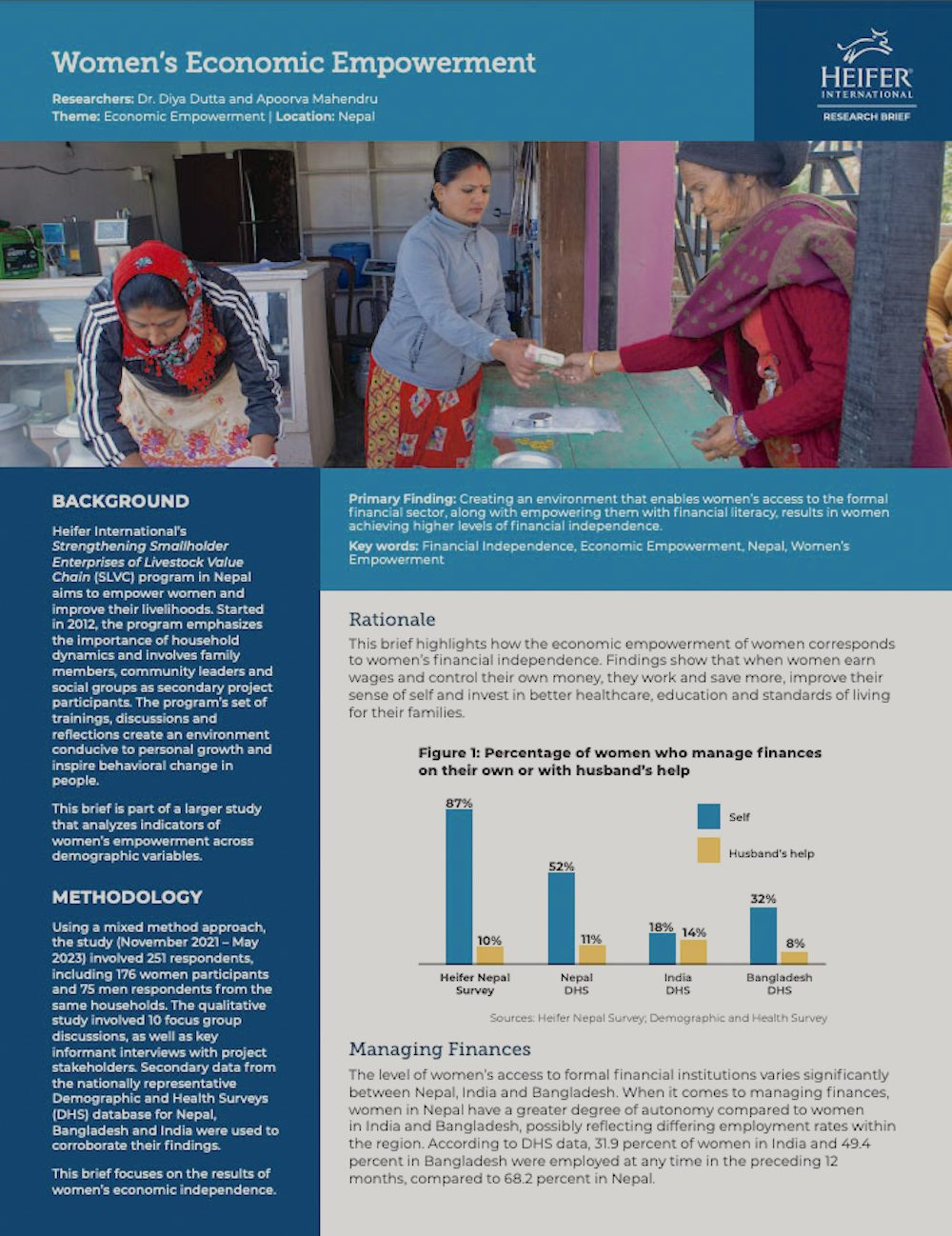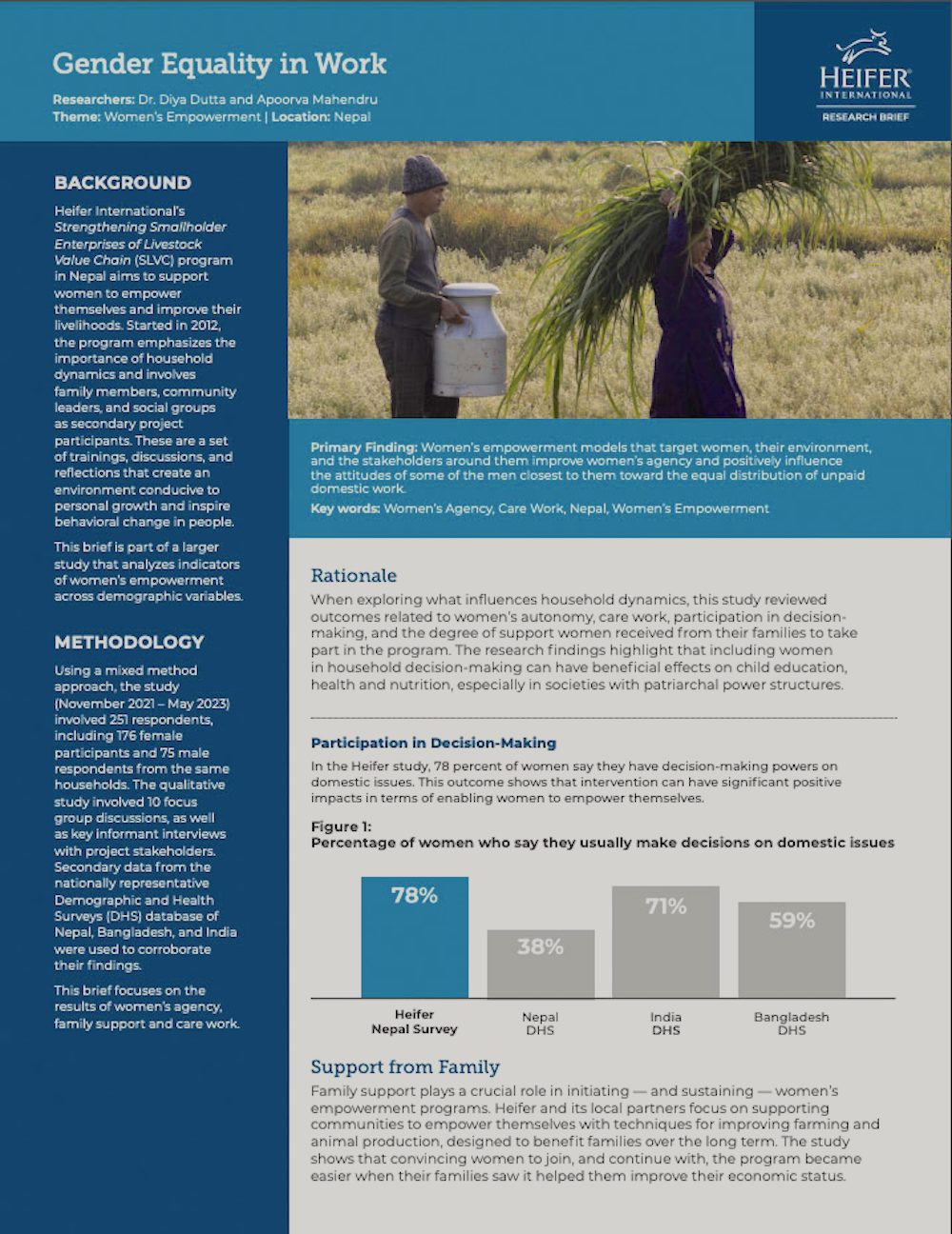
Nepal is rich in culture and tradition. Yet, it has also grappled with social norms that can limit opportunities for women. These norms, often rooted in patriarchal social structures, can restrict women’s access to education and opportunities.
A study in Nepal showed that women participating in a Heifer International rural development program registered higher levels of economic empowerment and measures of gender equality, while the program also contributed to reduced acceptance of gender-based violence (GBV) within the women’s families.
The study, conducted by two independent researchers between November 2021 and May 2023, focused on Heifer’s Strengthening Smallholder Enterprises of Livestock Value Chain (SLVC) program in Nepal. The program aims to support smallholder farming women to empower themselves and improve their livelihoods. The program began in 2012 and emphasizes the role of household dynamics while engaging family members, community leaders and social groups as secondary project participants. The study used a mix of quantitative and qualitative methods.

An area of analysis focusing on women’s economic empowerment showed that creating an environment that enables women’s access to the formal financial sector, along with empowering them with financial literacy, results in women achieving higher levels of financial independence.
This research revealed that when women have control of their finances, they work more and save more, improve their sense of self and invest in better living standards for their families. In Nepal, Heifer’s SLVC intervention was shown to have significantly improved women’s financial autonomy, with a high percentage of women in the program becoming the primary decision-makers for their personal finances. A key indicator of this was the fact that 77 percent of the women program participants surveyed said they have a bank account, which compares with only 41 percent of women surveyed for Nepal’s latest nationally representative Demographic and Health Survey (DHS).
The study also assessed measures of gender equality in work, showing that a programmatic approach targeting women, their environment and the stakeholders around them can improve women’s agency and positively influence the attitudes of some of the men closest to them toward the equal distribution of unpaid domestic work.

Most respondents — 78 percent of women participants — said they have decision-making powers on domestic issues, compared to 38 percent in the DHS, showing the intervention can have significant positive impacts in enabling women to empower themselves.
This research also underlined the critical role of family support in both initiating and sustaining progress in women’s empowerment and strengthening decision-making. Convincing women to join and continue with the program became easier when their families saw that it helped them improve their economic status. Though this research revealed initial opposition from many mothers-in-law toward their daughters-in-law’s participation in the program, as the program's benefits became clear, many mothers-in-law changed their minds and supported their family's involvement.
In the most significant study, the researchers delved into attitudes and perceptions related to GBV in the women participants’ families and communities. Heifer’s intervention was shown to make significant strides in changing societal perceptions of GBV, particularly concerning domestic violence.
Acceptability_of_Violence_in_Nepal_Brief.jpg?or=0&q=60&crop=faces,entropy&auto=format&fm=jpeg&shad=50&vib=20&duotone-alpha=40&duotone=000000,2CFFD4C6&w=1000)
For example, in the context of neglecting children, only 2 percent of women believed that violence against a wife is justified, compared to close to 25 percent in the Nepal DHS. These outcomes indicate that the Heifer SLVC program in Nepal successfully challenged patriarchal beliefs and fostered a more supportive and equal environment.
As in the gender equality in work module, the GBV area of investigation also indicated that, as the benefits of the program became evident with time, women started feeling more supported by their family members to engage in program interventions. Fifty-five percent of the women in this study said their husbands supported them in joining the Heifer program, highlighting that men started recognizing — and appreciating — the valuable contributions of their wives, further elevating women’s status within the household.
The primary researchers on this study are Dr. Diya Dutta, an independent consultant in social development research and Apoorva Mahendru, an associate consultant with NuSocia. For more information about the studies and Heifer’s work in Nepal, contact Prabin Gurung, Heifer Nepal knowledge management and communication manager, at Prabin.Gurung@heifer.org.